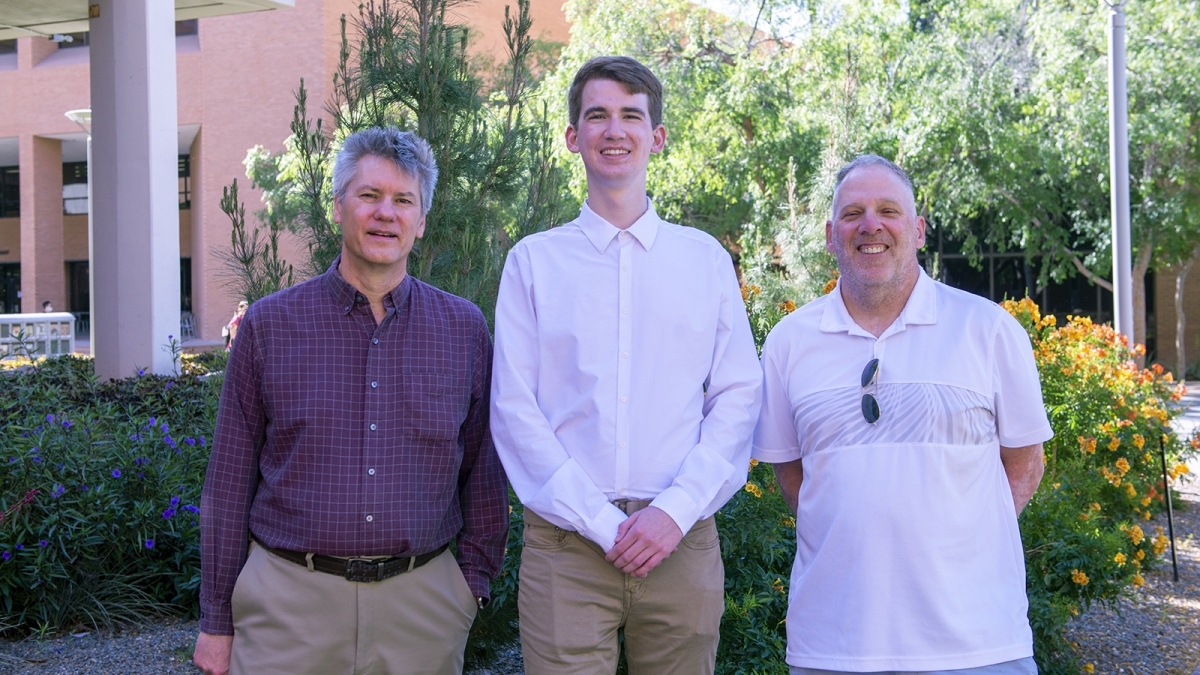ASU student awarded inaugural carbon capture scholarship

Kevin Redding (left), director of ASU Center for Bioenergy and Photosynthesis, with scholarship winner Riley Seminara (center) and philanthropist Martin Hudson.
The amount of carbon dioxide in the atmosphere is connected to its ability to trap heat at Earth’s surface. Carbon dioxide removed from the atmosphere, a process referred to as carbon capture, is a potential source of renewable energy.
The Martin Hudson Scholarship for Carbon Capture and Sustainable Energy was created to provide ASU students with the resources to participate in undergraduate research related to carbon capture and sustainable energy production. The scholarship was established this year by Martin N. Hudson, an electrical engineer and longtime Arizona resident.
“I established this scholarship because I felt I needed to personally do more to help the environment,” Hudson said. “It’s not much, but if we all do more, together we can move things in the right direction.”
The first recipient of the scholarship, Riley Seminara, is a sophomore majoring in biochemistry and chemical engineering. He is conducting a research project on carbon dioxide reduction using hydrogen gas with School of Molecular Sciences Associate Professor Ryan Trovitch.
“Riley is an ideal recipient of the inaugural Martin Hudson Scholarship for Carbon Capture and Sustainable Energy given his interests in identifying and developing new homogeneous catalysts for the hydrogenation of carbon dioxide to generate methanol," Trovitch said. "Although he is in the early stages of addressing this particularly difficult chemical challenge, his background in both chemistry and chemical engineering puts him in a unique position to make meaningful contributions to the field. I believe this award will provide Riley with extra encouragement to pursue the carbon dioxide utilization research that our society desperately needs.”
Hudson and Riley first met in 2022, in ASU’s Center for Bioenergy and Photosynthesis. Kevin Redding, the center’s director and School of Molecular professor, facilitated the meeting.
“I’m happy to bring together Riley and Mr. Hudson. We appreciate his generosity and support of our students who are working with us and our faculty on these difficult but very important scientific challenges that impact the world we live in and leave to our children,” Redding said.
More Science and technology

Applied Materials invests in ASU to advance technology for a brighter future
For nearly 60 years, global giant Applied Materials has been hard at work engineering technology that continues to change how…

Meet ASU engineering students who are improving health care, computing and more
Furthering knowledge of water resource management, increasing the efficiency of manufacturing point-of-care health diagnostic…

Turning up the light: Plants, semiconductors and fuel production
What can plants and semiconductors teach us about fuel production?ASU's Gary Moore hopes to find out.With the aim of learning how…

